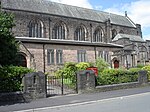Moss Bank Park, Bolton
Parks and open spaces in Greater ManchesterTourist attractions in the Metropolitan Borough of Bolton
Moss Bank Park is a 34.25 hectares (84.6 acres) park in Bolton, Greater Manchester, England. It consists of open space, woodland, gardens and other facilities. Moss Bank Park has been awarded the Green Flag Standard in 2008 and 2009. The Green Flag Scheme is a national standard for public parks and green spaces that aims to raise standards across the UK. This award puts Moss Bank Park alongside Brighton Pier, London Zoo, Alton Towers and the Norfolk Broads.Moss Bank Park formerly contained a small zoo and tropical butterfly house. The aviary is home to a historic tower that was originally built as an astronomical observatory by John Horrocks Ainsworth (d. 1864).
Excerpt from the Wikipedia article Moss Bank Park, Bolton (License: CC BY-SA 3.0, Authors).Moss Bank Park, Bolton
Barrow Bridge Road,
Geographical coordinates (GPS) Address Nearby Places Show on map
Geographical coordinates (GPS)
| Latitude | Longitude |
|---|---|
| N 53.5962 ° | E -2.4667 ° |
Address
Barrow Bridge Road
Barrow Bridge Road
BL1 7NL
England, United Kingdom
Open on Google Maps





